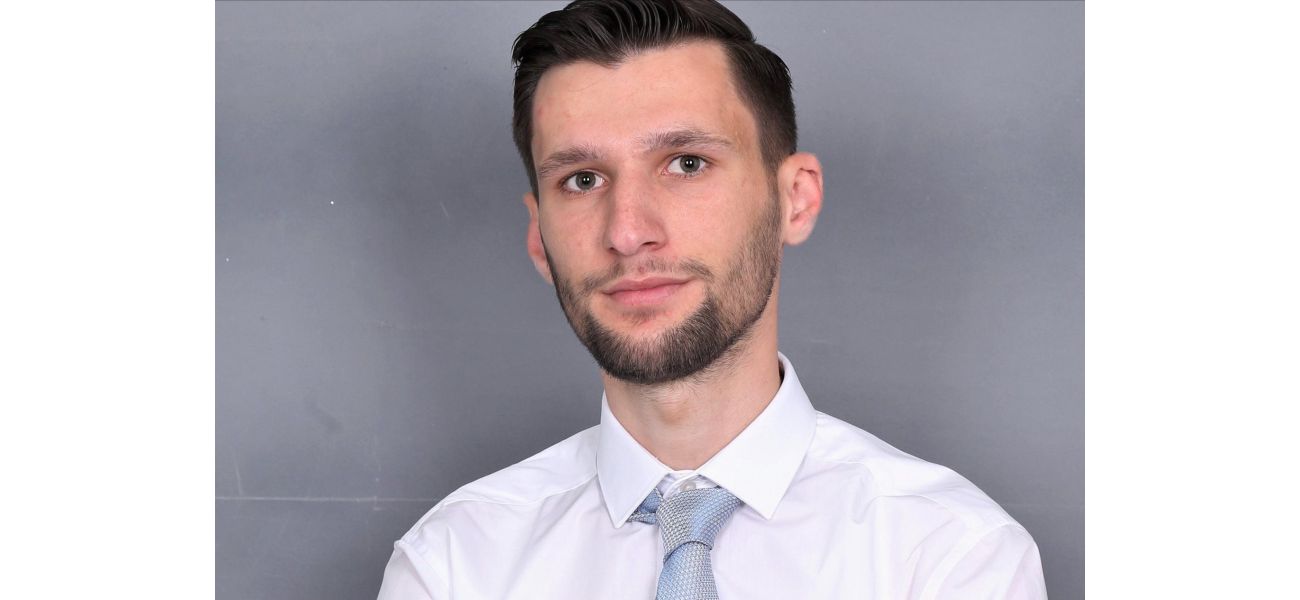I moved to UK hoping for a better life, but it didn't turn out as expected.
My perception of the UK as a prosperous country was shattered after a month of witnessing poverty.
September 9th 2024.

I never would have guessed that moving to the UK would place me in one of the poorest areas in the country: Croydon. Every day, I receive the same mundane email in my inbox, politely thanking me for my interest in a job but ultimately informing me that my application will not be taken further. It always makes me pause and question if leaving my home in Albania and spending £35,000 to come to London was truly worth it. Has my move to the UK truly changed my life for the better?
Studying in London had always been my dream. I come from a working-class family in Kukës, a region in northern Albania known for its poverty. Since I was a teenager, I have aspired to be a journalist. I believe in the importance of media independence, something that my native country lacks as evidenced by its low ranking of 99th out of 180 countries for press freedom by Reporters Without Borders. I wanted to have the opportunity to tell the truth about society, and Albania simply did not offer me that chance for a successful career.
My desire to find where I belonged and explore other opportunities led me abroad, where the possibilities seemed endless. I knew that London, with its prestigious universities, especially for journalism, was where I wanted to be. In 2024, I was accepted into a master's program in journalism at City, University of London. It was a dream come true, and I was finally moving to the UK to study in London. To save money, I also secured a job as a communication campaign lead coordinator for an international NGO in Albania. My brother in Italy even helped me get a £10,000 loan to cover my university fees and visa costs.
Last September, I applied for a UK student visa in Albania after passing an English Language test. When I received my passport with the visa sticker, it finally hit me that I had accomplished my dream. I was moving to the UK to study in London. When I first told my parents about my plans, my father, who had previously migrated to Italy, was against it. His own experiences made him fearful that I would never return once I left. On the other hand, my mother, a former teacher, was more supportive. She always encouraged my education and wanted me to have the opportunity to study outside of Albania. As I said goodbye to my parents at the airport, both of them were in tears. I was filled with a mix of excitement for what was to come, but also guilt for leaving my parents behind, uncertain if I would ever return.
My first encounter with a UK migration officer involved a series of questions about where I was coming from, if it was my first time in the country, what I was studying, and which university I would be attending. I wasn't surprised to be treated with suspicion, considering the negative representation of Albanian migrants in the media and British politics. However, once I started university in London, that suspicion quickly dissipated. My English friends and professors were curious to learn about my small country in southeastern Europe. The university offered all the facilities and resources I had hoped for, including access to hundreds of online resources and a highly professional teaching staff. It was everything I had dreamed of and more.
One of my first assignments was to interview people for news stories in Hackney, which was challenging but also allowed me to get to know new people and places. Most of my classmates were English, and I found it surprisingly easy to make new friends. London, with its stunning architecture, vibrant atmosphere, and cultural offerings such as museums and libraries, was everything I had hoped for. As a Chelsea football fan, I even got to visit Stamford Bridge stadium.
Luckily, I was able to stay with relatives in South London, which gave me a sense of being at home. However, I didn't realize that I had accidentally moved from a poor country to one of the poorest areas in the capital: Croydon. When Albanian migrants return to their home country for holidays, they often flaunt their luxurious UK lifestyles, showcasing their UK license plates and brand new clothes from North Face or even starting businesses with the money they made in the UK. This creates a false reality of a wealthy and successful life abroad, but the truth is far from it.
In Croydon, I saw many young homeless people, especially in train stations. I also noticed that people were constantly vaping and eating unhealthy foods because they couldn't afford anything else. After only a month of living in the UK, my idealized image of the country was slowly being shattered. I also found it incredibly difficult to secure a job in the journalism field. Even if I was able to get one, the maximum salary for entry-level journalism jobs in the UK seemed to be around £33,000 per year, which would be difficult to live on in London, especially considering I would need to pay £3,000 for a graduate visa to have the right to work for two more years. In comparison, my previous job in Albania, which was not well-paid, had a medium monthly salary of £500, but at least I had money left in my pocket after payday.
After five months of studying in the UK, I felt like I had no choice but to take a job at a construction site to make ends meet. It was easy to get a job in this industry through my Albanian connections, as it is a preferred industry for many of my compatriots who come to the UK illegally. While working on the site, I met a young Albanian man who told me he had arrived in the UK two years ago in a small boat as an illegal migrant. When I asked him if he liked it here, he replied, "No, I don't like it, but what can I do in Albania? I can't return." It was clear that he was disappointed with the life he found in the UK, but he had no other options. He didn't have the same opportunities as I did to study, and many illegal Albanian migrants have to support their families financially back home. If life was already difficult for me with a visa, I could only imagine how challenging it must be for them.
After seven months, I had to pay £50 to see an emergency dentist. The fee shocked me, and when I told the dentist my nationality, he suggested that I should go back to Albania because dental care there is much cheaper. This made me think about the young man I had met at the construction site and what he would do in my situation. It's been a year now since I moved to the UK, and I feel exhausted from the difficulties I have faced. The struggles of other migrants give me hope and encourage me not to give up until I find a job, but I can't help but feel conflicted. With all the money I've spent, the lack of well-paid journalism work, and the sacrifice of not being able to see my family and friends, I'm not sure if it's possible for me to stay in the UK and fulfill my dreams. Working in construction has made me realize that I will never have the same social standing and opportunities that I had in my home country. Even if things don't go well, and I am forced to return to Albania, I will make sure to share the truth with other young people who dream of coming to the UK for a better life. The reality is that it doesn't exist, and it's not worth it.
Studying in London had always been my dream. I come from a working-class family in Kukës, a region in northern Albania known for its poverty. Since I was a teenager, I have aspired to be a journalist. I believe in the importance of media independence, something that my native country lacks as evidenced by its low ranking of 99th out of 180 countries for press freedom by Reporters Without Borders. I wanted to have the opportunity to tell the truth about society, and Albania simply did not offer me that chance for a successful career.
My desire to find where I belonged and explore other opportunities led me abroad, where the possibilities seemed endless. I knew that London, with its prestigious universities, especially for journalism, was where I wanted to be. In 2024, I was accepted into a master's program in journalism at City, University of London. It was a dream come true, and I was finally moving to the UK to study in London. To save money, I also secured a job as a communication campaign lead coordinator for an international NGO in Albania. My brother in Italy even helped me get a £10,000 loan to cover my university fees and visa costs.
Last September, I applied for a UK student visa in Albania after passing an English Language test. When I received my passport with the visa sticker, it finally hit me that I had accomplished my dream. I was moving to the UK to study in London. When I first told my parents about my plans, my father, who had previously migrated to Italy, was against it. His own experiences made him fearful that I would never return once I left. On the other hand, my mother, a former teacher, was more supportive. She always encouraged my education and wanted me to have the opportunity to study outside of Albania. As I said goodbye to my parents at the airport, both of them were in tears. I was filled with a mix of excitement for what was to come, but also guilt for leaving my parents behind, uncertain if I would ever return.
My first encounter with a UK migration officer involved a series of questions about where I was coming from, if it was my first time in the country, what I was studying, and which university I would be attending. I wasn't surprised to be treated with suspicion, considering the negative representation of Albanian migrants in the media and British politics. However, once I started university in London, that suspicion quickly dissipated. My English friends and professors were curious to learn about my small country in southeastern Europe. The university offered all the facilities and resources I had hoped for, including access to hundreds of online resources and a highly professional teaching staff. It was everything I had dreamed of and more.
One of my first assignments was to interview people for news stories in Hackney, which was challenging but also allowed me to get to know new people and places. Most of my classmates were English, and I found it surprisingly easy to make new friends. London, with its stunning architecture, vibrant atmosphere, and cultural offerings such as museums and libraries, was everything I had hoped for. As a Chelsea football fan, I even got to visit Stamford Bridge stadium.
Luckily, I was able to stay with relatives in South London, which gave me a sense of being at home. However, I didn't realize that I had accidentally moved from a poor country to one of the poorest areas in the capital: Croydon. When Albanian migrants return to their home country for holidays, they often flaunt their luxurious UK lifestyles, showcasing their UK license plates and brand new clothes from North Face or even starting businesses with the money they made in the UK. This creates a false reality of a wealthy and successful life abroad, but the truth is far from it.
In Croydon, I saw many young homeless people, especially in train stations. I also noticed that people were constantly vaping and eating unhealthy foods because they couldn't afford anything else. After only a month of living in the UK, my idealized image of the country was slowly being shattered. I also found it incredibly difficult to secure a job in the journalism field. Even if I was able to get one, the maximum salary for entry-level journalism jobs in the UK seemed to be around £33,000 per year, which would be difficult to live on in London, especially considering I would need to pay £3,000 for a graduate visa to have the right to work for two more years. In comparison, my previous job in Albania, which was not well-paid, had a medium monthly salary of £500, but at least I had money left in my pocket after payday.
After five months of studying in the UK, I felt like I had no choice but to take a job at a construction site to make ends meet. It was easy to get a job in this industry through my Albanian connections, as it is a preferred industry for many of my compatriots who come to the UK illegally. While working on the site, I met a young Albanian man who told me he had arrived in the UK two years ago in a small boat as an illegal migrant. When I asked him if he liked it here, he replied, "No, I don't like it, but what can I do in Albania? I can't return." It was clear that he was disappointed with the life he found in the UK, but he had no other options. He didn't have the same opportunities as I did to study, and many illegal Albanian migrants have to support their families financially back home. If life was already difficult for me with a visa, I could only imagine how challenging it must be for them.
After seven months, I had to pay £50 to see an emergency dentist. The fee shocked me, and when I told the dentist my nationality, he suggested that I should go back to Albania because dental care there is much cheaper. This made me think about the young man I had met at the construction site and what he would do in my situation. It's been a year now since I moved to the UK, and I feel exhausted from the difficulties I have faced. The struggles of other migrants give me hope and encourage me not to give up until I find a job, but I can't help but feel conflicted. With all the money I've spent, the lack of well-paid journalism work, and the sacrifice of not being able to see my family and friends, I'm not sure if it's possible for me to stay in the UK and fulfill my dreams. Working in construction has made me realize that I will never have the same social standing and opportunities that I had in my home country. Even if things don't go well, and I am forced to return to Albania, I will make sure to share the truth with other young people who dream of coming to the UK for a better life. The reality is that it doesn't exist, and it's not worth it.
[This article has been trending online recently and has been generated with AI. Your feed is customized.]
[Generative AI is experimental.]
0
0
Submit Comment





